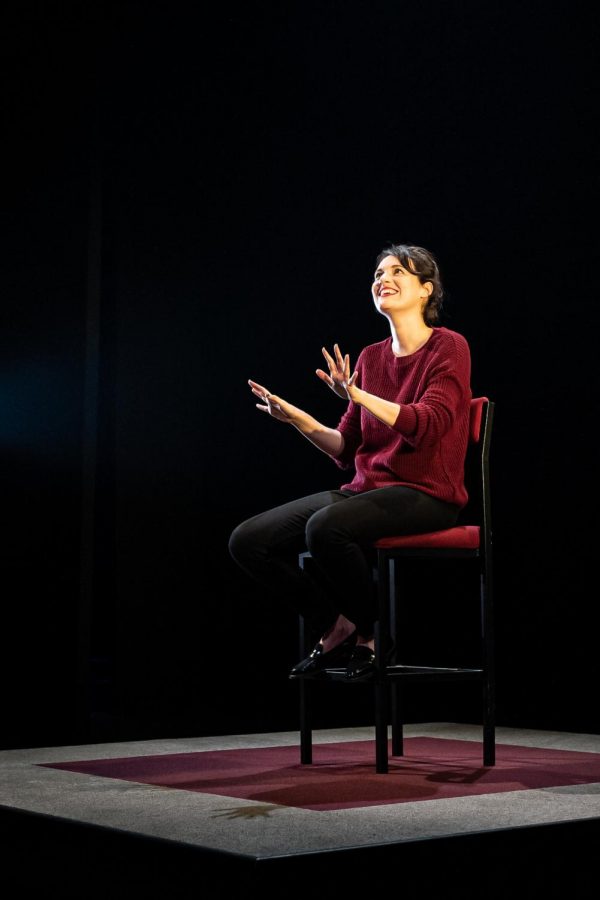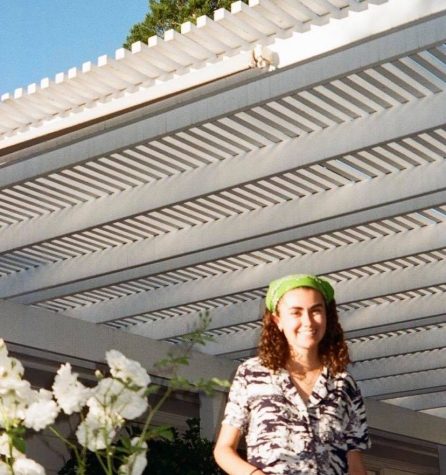Phoebe Waller-Bridge’s “Fleabag” at the Minneapolis Film Society
November 14, 2019
Phoebe Waller-Bridge is a name you should know. She just won three Primetime Emmy awards for writing and starring in Amazon’s “Fleabag.” She was subsequently nominated for two more Emmys for the BBC’s “Killing Eve.” She’s co-writing the upcoming James Bond movie, “No Time to Die” and she just hosted “Saturday Night Live” — among many other accolades.
Waller-Bridge made a name for herself at the Edinburgh Fringe Festival in August of 2013 when she burst onto the scene with the one-woman show, “Fleabag.” It challenged popular themes of feminism, sexual freedom and friendship. The semi-autobiographical play floors audiences as its dark comedy and plot twists uncover just how hard it is to be a woman in the early 21st century.
The Minneapolis Film Society hosted a screening of the play version of “Fleabag” in partnership with National Theatre Live on Nov. 11 and 13. The independent movie theater by St. Anthony Falls is small and has the personality of a traditional theater. The screened performance of “Fleabag” was shot in September at Wyndham’s Theater in London, and played in select theaters around the United States.
“Fleabag,” the play, served as the inspiration for Amazon’s show of the same name, which ran for two seasons. Despite critical acclaim, Waller-Bridge refuses to make a third season citing that she feels “the story is complete.”
Following sold out runs of the play in London, South Korea and Australia, Waller-Bridge made her Broadway debut with “Fleabag” in March of this year. In August, she returned to London’s West End for a final three week run.
Waller-Bridge wrote and stars in “Fleabag,” which Vicky Jones directed, Holly Pigott did scenic design, Elliot Griggs designed the lights and Waller-Bridge’s sister, Isobel Waller-Bridge, did the sound design.
The award winning play follows an anonymous protagonist — known as Fleabag by audiences and played by Waller-Bridge — as she recounts her life story. To get a taste for Waller-Bridge’s sarcasm, you need not look further than the Minneapolis Film Society’s description of the show, which describes the play as a “rip-roaring look at some sort of woman, living her sort of life.”
“With family and friendships under strain, and a guinea pig café struggling to stay afloat, Fleabag suddenly finds herself with nothing to lose,” the Minneapolis Film Society wrote.
The play is much more intimate than Amazon’s “Fleabag,” as it only features Waller-Bridge sitting alone on the stage. Waller-Bridge’s signature lines from television, coupled with her fearlessness in approaching controversial topics, easily transition to the stage version of the show. It was her physical presence, however, that I found starkest in the play.
Waller-Bridge sits alone on a high top chair with a dark backdrop behind her. She doesn’t seem completely comfortable in the seat, but her captivating knack for telling stories distracts from her fidgeting. And although she doesn’t use props, Waller-Bridge performs well enough to convince the audience of her varied talent — rousing an enormous laugh out of the audience while mimicking scrolling through nude photos on her phone, for example.
Voiceovers minimally interrupt the almost two-hour long monologue, engaging the protagonist in conversation, which felt out of touch with the cadence of the show. It was almost like being woken from a trance as the sounds of doors slamming, for example, disturbed me from focusing on Waller-Bridge. Her performance was so careful that I didn’t want to remember that things could burst the bubble “Fleabag” exists in.
The script is masterful in that it’s simple; the director of Amazon’s “Fleabag,” Harry Bradbeer, told Vogue that, “Waller-Bridge takes a ‘tickle, tickle, slap’ approach to her work, seducing the audience with laughter and then hitting them square in the face with something shocking.”
There’s obvious humor in that the protagonist runs a guinea pig-themed café and dates a man whom she calls “Tube Rodent,” but there’s also wit in how Waller-Bridge draws out pauses between heavy subject matter. She’s comfortable in silence — which takes some getting used to as an audience member when the entire theater goes quiet for much longer than what you find in mainstream theater. However, Waller-Bridge relishes those suspended moments, and prompts the audience to do the same.
The play’s approach to feminism is curious. Third-wave feminism tries to combat the contradictory nature of judgement that dictated second-wave feminism by disregarding norms altogether. But “Fleabag” embraces doubt in the most sincere, authentic and complicated fashion. Waller-Bridge admits to struggling with her identity as a feminist while wanting a traditional “perfect body” so badly that she’ll give up five years of her life, for example.
Similar attempts at tackling third-wave feminism can be found in Hulu’s “Shrill” or HBO’s “Girls,” where female characters concede to stereotypes they morally object to. But none compare to Waller-Bridge’s matching of comedy and intimacy as it creatively challenged my own internalized misogyny.
“Fleabag” has a dark component: the protagonist’s best friend recently died and an accident with a guinea pig changes the course of the play. Some of the intense moments in the television adaptation of “Fleabag” are more diluted by audio and visuals, so it was interesting to compare the even more impactful differences between comedy and drama in the play.
I found that I didn’t like one version of the story better than the other. I enjoy the acting from the television series — there’s a “hot priest” in season two and the actress who plays Fleabag’s sister (Sian Clifford) is incredible — but Waller-Bridge’s shock factor in the play is impactful.
Expect to hear more from Waller-Bridge, whether it be from her screenwriting or her subversive feminist commentary. National Theatre Live continues to distribute similar screenings, and two seasons of “Fleabag” the television series are available on Amazon Prime.













